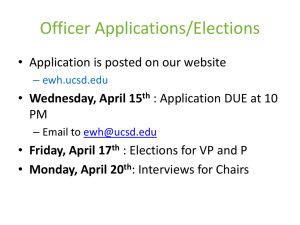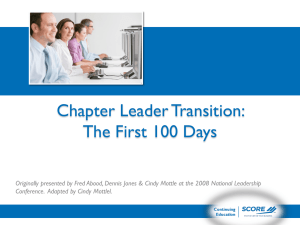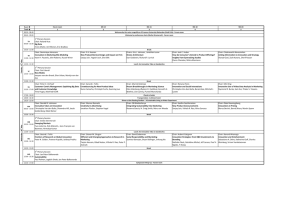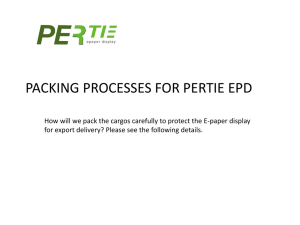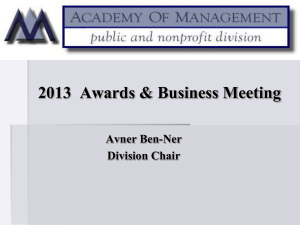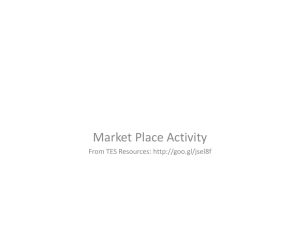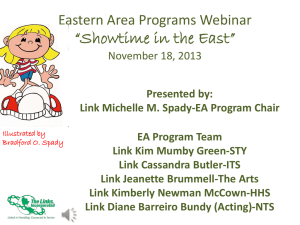Presentation
advertisement
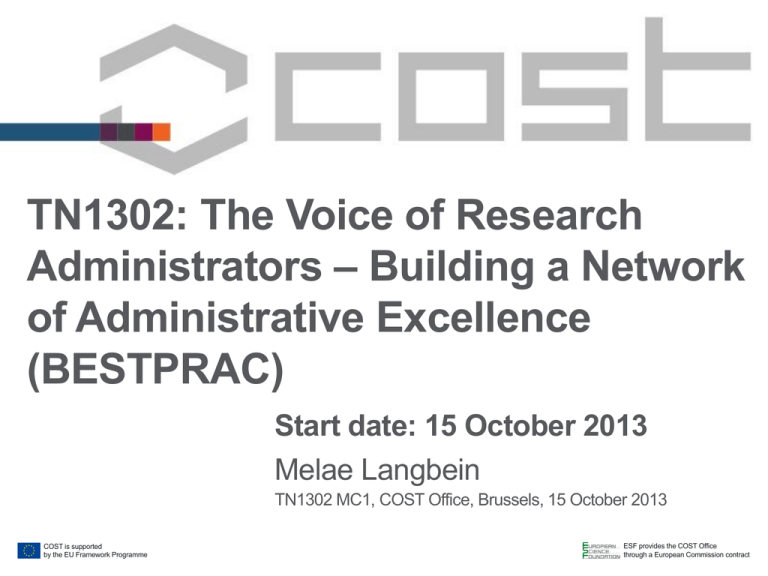
TN1302: The Voice of Research Administrators – Building a Network of Administrative Excellence (BESTPRAC) Start date: 15 October 2013 Melae Langbein TN1302 MC1, COST Office, Brussels, 15 October 2013 COST is supported by the EU Framework Programme ESF provides the COST Office through a European Commission contract AGENDA 1. Welcome 15/10/2013 09:00-17:00 2. Adoption of the agenda 3. Address from Director of the COST Office 4. Status of the COST Action 5. Presentation of the delegations 6. General information on COST mechanism 7. Agreement on the internal rules of procedure for the MC of the COST Action 8. Election of Chair (and Vice-Chair) of the Action 9. Appointment of: Grant Holder, 2 Financial Rapporteurs (Lunch) 10. Working plan for the implementation of the COST Action (Memorandum of Understanding) – – – – – – objectives and working programme organisation and management (including Working Groups, Core Group) distribution of tasks and election of WG Leaders and STSM Coordinator/ Committee Action website promotion of gender balance and of Early Stage Researchers time-table for the Action, activity plan and budget for first budget year 11. Budget Plan for the first period 12. Place and date of next meeting 13. AOB 14. Closing 2 AGENDA 1. Welcome 15/10/2013 09:00-17:00 2. Adoption of the agenda 3. Address from Director of the COST Office 4. Status of the COST Action 5. Presentation of the delegations 6. General information on COST mechanism 7. Agreement on the internal rules of procedure for the MC of the COST Action 8. Election of Chair (and Vice-Chair) of the Action 9. Appointment of: Grant Holder, 2 Financial Rapporteurs (Lunch) 10. Working plan for the implementation of the COST Action (Memorandum of Understanding) – – – – – – objectives and working programme organisation and management (including Working Groups, Core Group) distribution of tasks and election of WG Leaders and STSM Coordinator/ Committee Action website promotion of gender balance and of Early Stage Researchers time-table for the Action, activity plan and budget for first budget year 11. Budget Plan for the first period 12. Place and date of next meeting 13. AOB 14. Closing 3 AGENDA 1. Welcome 15/10/2013 09:00-17:00 2. Adoption of the agenda 3. Address from Director of the COST Office 4. Status of the COST Action 5. Presentation of the delegations 6. General information on COST mechanism 7. Agreement on the internal rules of procedure for the MC of the COST Action 8. Election of Chair (and Vice-Chair) of the Action 9. Appointment of: Grant Holder, 2 Financial Rapporteurs (Lunch) 10. Working plan for the implementation of the COST Action (Memorandum of Understanding) – – – – – – objectives and working programme organisation and management (including Working Groups, Core Group) distribution of tasks and election of WG Leaders and STSM Coordinator/ Committee Action website promotion of gender balance and of Early Stage Researchers time-table for the Action, activity plan and budget for first budget year 11. Budget Plan for the first period 12. Place and date of next meeting 13. AOB 14. Closing 4 AGENDA 1. Welcome 15/10/2013 09:00-17:00 2. Adoption of the agenda 3. Address from Director of the COST Office 4. Status of the COST Action 5. Presentation of the delegations 6. General information on COST mechanism 7. Agreement on the internal rules of procedure for the MC of the COST Action 8. Election of Chair (and Vice-Chair) of the Action 9. Appointment of: Grant Holder, 2 Financial Rapporteurs (Lunch) 10. Working plan for the implementation of the COST Action (Memorandum of Understanding) – – – – – – objectives and working programme organisation and management (including Working Groups, Core Group) distribution of tasks and election of WG Leaders and STSM Coordinator/ Committee Action website promotion of gender balance and of Early Stage Researchers time-table for the Action, activity plan and budget for first budget year 11. Budget Plan for the first period 12. Place and date of next meeting 13. AOB 14. Closing 5 AGENDA 1. Welcome 15/10/2013 09:00-17:00 2. Adoption of the agenda 3. Address from Director of the COST Office 4. Status of the COST Action 5. Presentation of the delegations 6. General information on COST mechanism 7. Agreement on the internal rules of procedure for the MC of the COST Action 8. Election of Chair (and Vice-Chair) of the Action 9. Appointment of: Grant Holder, 2 Financial Rapporteurs (Lunch) 10. Working plan for the implementation of the COST Action (Memorandum of Understanding) – – – – – – objectives and working programme organisation and management (including Working Groups, Core Group) distribution of tasks and election of WG Leaders and STSM Coordinator/ Committee Action website promotion of gender balance and of Early Stage Researchers time-table for the Action, activity plan and budget for first budget year 11. Budget Plan for the first period 12. Place and date of next meeting 13. AOB 14. Closing 6 Status of the COST TN Chair: ? Rapporteurs: To be appointed by CSO Budget: ~162 000 € (COST countries) for GP1 (1 November 2013 - 31 December 2014) 7 Status of the COST TN Parties (14/10/2013) 8 AGENDA 1. Welcome 15/10/2013 09:00-17:00 2. Adoption of the agenda 3. Address from Director of the COST Office 4. Status of the COST Action 5. Presentation of the delegations 6. General information on COST mechanism 7. Agreement on the internal rules of procedure for the MC of the COST Action 8. Election of Chair (and Vice-Chair) of the Action 9. Appointment of: Grant Holder, 2 Financial Rapporteurs (Lunch) 10. Working plan for the implementation of the COST Action (Memorandum of Understanding) – – – – – – objectives and working programme organisation and management (including Working Groups, Core Group) distribution of tasks and election of WG Leaders and STSM Coordinator/ Committee Action website promotion of gender balance and of Early Stage Researchers time-table for the Action, activity plan and budget for first budget year 11. Budget Plan for the first period 12. Place and date of next meeting 13. AOB 14. Closing 9 AGENDA 1. Welcome 15/10/2013 09:00-17:00 2. Adoption of the agenda 3. Address from Director of the COST Office 4. Status of the COST Action 5. Presentation of the delegations 6. General information on COST mechanism 7. Agreement on the internal rules of procedure for the MC of the COST Action 8. Election of Chair (and Vice-Chair) of the Action 9. Appointment of: Grant Holder, 2 Financial Rapporteurs (Lunch) 10. Working plan for the implementation of the COST Action (Memorandum of Understanding) – – – – – – objectives and working programme organisation and management (including Working Groups, Core Group) distribution of tasks and election of WG Leaders and STSM Coordinator/ Committee Action website promotion of gender balance and of Early Stage Researchers time-table for the Action, activity plan and budget for first budget year 11. Budget Plan for the first period 12. Place and date of next meeting 13. AOB 14. Closing 10 What is a Targeted Network? Approved by CSO under COST 4111/13 “Guided bottom up” Operates according to same rules as a COST Action 11 Why was BESTPRAC approved? Target: "staff in the universities and research institutions doing the administrative and financial work“ To enable them to: Meet counterparts from other countries Harmonise approaches to common issues 12 BESTPRAC is not: For: Researchers Project Managers Managers EARMA 13 General information on COST 14 What is COST? COST is the oldest and widest European intergovernmental framework for transnational Cooperation in Science and Technology. For 40 years COST has supported networking of research activities across all its Member countries (36 today) and beyond. COST is open to all disciplines, to all novel and ground-breaking S&T ideas, to all categories of partners, to the world where mutual benefit is real. 15 What is COST Mission? COST enables breakthrough scientific developments leading to new concepts and products. It thereby contributes to strengthen Europe’s research and innovation capacities. 16 What are COST Principles? Highest S&T Quality S&T-driven (bottom-up) Transdisciplinarity Young researchers Sharing knowledge Inclusive Leverage 17 What are COST features? Intergovernmental Pan-European Open to global cooperation on the base of mutual interest Light-weight administration Easy implementation 18 COST Countries The 28 EU Member States EU Acceding & Candidate Countries former Yugoslav Republic of Macedonia Iceland Republic of Serbia Turkey Other Countries Bosnia and Herzegovina Norway Switzerland COST Cooperating State Israel 19 Global dimension Under COST International Cooperation Rules (COST 4115/13) institutions from all countries outside the COST countries can also participate (on the basis of mutual benefit): Near Neighbour Countries: Albania, Algeria, Armenia, Azerbaijan, Belarus, Egypt, Georgia, Lebanon, Libya, Montenegro, Moldova, Morocco, The Palestinian Authority, Russian Federation, Syria, Tunisia and Ukraine; International Partner Countries With Reciprocal Agreement: Argentina,. New Zealand, South Africa Without any special arrangement: all other countries that are not NNC Specific Organisations: European Commission, European Agencies, European RTD Organisations, International Organisations But, like COST country participants, any non-COST country participant must be able to participate in the Action without need for a translator. 20 Near Neighbour countries participation 191 Participations in running COST Actions (17 countries) – Sept. 2013 Russia (49) Belarus (5) Moldova (4) Ukraine (37) Montenegro (11) Georgia (6) Albania (13) Azerbaijan (5) COST Countries Morocco (14) Armenia (5) Syria (2) Tunisia (13) Lebanon (7) Pal. Authority (1) Jordan (3) NN Countries Algeria (7) Egypt (9) 11 International Partner Countries Participation in COST Actions excluding Near Neighbour Countries Canada (44) China (29) USA (124) Iran (2) Saudi Arabia (1) Mexico (9) Costa Rica (1) India (7) Taiwan (2) Hong Kong (3) Thailand (1) Singapore (4) Brazil (13) only one Action Pakistan (4) Bangladesh (1) Peru (1) Chile (3) Rep of Korea (3) Sudan (1) Colombia (2) COST Countries RA Countries Japan (17) Syria (2) Indonesia (1) Mauritius (1) Australia (131) Namibia (1) Uruguay (1) South Africa (38) Argentina (37) New Zealand (67) 547 Participations in running Actions (27 countries) – Sept. 2013 22 International Cooperation Process for institutes from NNC/ IPC/ Specific JOINING Organisations to join COST Actions: Either include non-COST country participant in proposal (in which case their participation is approved by CSO when proposal =>Action (and then online MC and DC confirmation), or • Chair encodes applicant details in eCOST • Applicant completes online template and emails “motivation letter” to Chair who uploads it, • then: online MC Approval, DC Approval, JAF Approval => official IPC/ NNC/ Specific Organisation participant. 23 International Cooperation - FINANCING Financing of participants from: Near Neighbour Countries (NNC) • One representative per NN institution per meeting per year (max. 2 per NN country at MC meeting) from special budget • STSMs from NN country institution to COST country (special budget) • Action budget can pay for STSM from COST country to participating institution in Near Neighbour country International Partner Countries (IPC) and Specific Organisations • Must finance their own participation in Action meetings (mutual benefit) • Action budget can pay for STSM from COST country to participating IPC/ Specific Organisation institution (not in the other direction) • Reciprocal Agreement (RA) Countries • Financing from COST (special RA budget) for COST Action members to visit participant in RA country (Reciprocal STSM “RSTSM”) – if insufficient funds under RA Action can pay from Action budget • Financing from national implementing agent for COST Action participant in RA country to attend COST meetings 24 COST Organisation Governance Operations EC Grant Agreement FP7 25 COST structure Council COST Secretariat COMMITTEE OF SENIOR OFFICIALS (CSO) COST National Coordinators COST OFFICE 9 COST Domain Committees COST Actions (~240) ….. FPS …… …….. ……. MC WG WORKING GROUPS (NETWORKS) …… ~30.000 researchers MC = Management Committee Scientific Domain COST structure: CSO Council COST Secretariat COMMITTEE OF SENIOR OFFICIALS (CSO) COST National Coordinators CSO 2 representatives / Party Responsible for the overall strategy and steering of COST deciding on the launching of individual Actions approving participation of institutes from NONCOST countries approving the prolongation/extension of Actions President: Ángeles Rodríguez-Peña (ES) COST structure: Domain Committee Domain Committee 1 representative / Party Responsible for FPS MC WG Scientific Domain assessment of proposals for new Actions monitoring of ongoing Actions evaluation of completed Actions dissemination and exploitation of results of a COST Action strategic developments in the Domain FPS DC Chair: Sjur Baardsen (NO) Action Management Committee • Max 2 representatives / Party MC WG WG Responsible for coordinating implementation of the Action ensuring scientific coordination at a national level managing the Action’s work and budget plans annual progress report Action Working Groups MC WG WG • a small number of researchers working together • MC members or other scientists from the Parties • invited experts / speakers (workshops / conferences) • members from non-COST institutes Responsible for production and exchange of Research What is funded by COST? COST Actions: A network of nationally funded projects receive a financial contribution based on a joint work programme for 4 years. At least 5 countries (expanding networks, average 25 countries in FPS) Across 9 Domains or interdisciplinary 31 What is funded by COST? COST Action networking tools: Meetings Science management meetings Working Group meetings Scientific workshops & seminars Training schools Scientific Exchange Visits (STSMs) Dissemination + publications 32 Implementation of COST Actions 33 Important documents COST Actions must be implemented in accordance with COST rules as described in: Rules for Participation in and Implementation of COST Activities (COST 4112/13) COST Action Management (COST 4114/13) – incl. Annex II “Rules of Procedure for Management Committees” COST International Cooperation rules (COST 4115/13) Guidelines for Monitoring, Evaluation and Dissemination of Results of COST Actions (COST doc. 4112/11) COST Strategy for Early Stage Researchers (COST 295/09) COST Code of Conduct (COST 4160/10) Memorandum of Understanding of the Action (ref. on slide 6) documents can be accessed at www.consilium.europa.eu/App/Search/searchCostReg.aspx?lang=EN&cmsid=707 COST Vademecum (Part B) – Grant System – Instruments for financing of COST Actions activities www.cost.esf.org/participate/guidelines 34 Geography, gender and ESRs COST Actions must respect a good balance in terms of: – Geography, – Gender, – Early Stage Researcher participation. in both the management (Steering Group (Chair, Vice Chair, WG Leaders, STSM Coordinator) and participation (reimbursement places, STSMs, Training Schools) levels of the Action Gender balance and ESR participation must be included on the agenda of each MC meeting* and the key points of the discussion recorded in the minutes. *Each MC meeting must use the MC Agenda template provided by the COST Office and minutes must be taken using the headings in this agenda. 35 Early Stage Researchers (COST 295/09) (≤ 8 years since PhD/ similar) (1/2) Support measure 1: Short Term Scientific Mission Set a target figure, from which a percentage of the Action budget shall be used for STSMs. STSMs of early stage researchers can be expanded in duration beyond 3 months in well justified cases. Financial support shall be increased accordingly. Support measure 2: Training Schools Training Schools shall already be planned at the proposal stage of a new COST Action. This shall be reflected in the criteria for the open call at the full proposal stage. The current level of this activity shall be raised. Support measure 3: Action Think Tank An early stage researchers' network may be created within the Action as a “think tank”. Each year one of the workshops of the Action would involve early stage researchers to strengthen links with each other and with experienced 36 scientists involved in the management of the Action. Early Stage Researchers (2/2) Support measure 4: Conference Grant Each Domain offers 3 supporting grants (max. 3000 Euro each) per year for early stage researchers to participate in an international conference outside of the COST Action activities. Support measure 5: Selection of Coordinators CSO recommends that Actions nominate early stage researchers as Working Group Coordinators. Support measure 6: Open Call The text as well as the criteria of the Open Call shall encourage early stage researchers to submit proposals to the Open Call. Support measure 7: Early stage researchers as national MC delegates Recommendation to the COST National Coordinators to nominate early stage researchers as national delegates whenever feasible 37 ESRs in the context of BESTPRAC Early Stage Researcher (ESR) in the context of BESTPRAC : a person in a university/ research institution doing (not managing!) the administrative and financial work and with less than 8 years since the end of their education/ start of their working career. 38 COST Code of Conduct (COST 4160/10) • COST expects from all participants ethical behaviour of researchers involved in COST activities at all levels. COST strives to avoid any kind of conflicts of interest in its framework. • All participants in COST should follow good practice in terms of a code of conduct and should not plagiarise or copy or use material in any unauthorised manner and should respect the rights and confidentialities of their colleagues, including IPR. • It is mandatory that any potential conflict of interest be declared. • In the case of the assessment of proposals for COST Actions, DC members and other assessors should not involve themselves in the assessment of proposals in which they have a personal or financial interest. • The basic principle of this Code of Conduct is to rely on the trustworthiness and own sense of responsibility of the persons involved. Self-certification and open declaration of potential Conflicts of Interest is the first expected action. 39 COST Code of Conduct (COST 4160/10) 40 COST Code of Conduct (COST 4160/10) Examples of things that would breach the COST Code of Conduct: • Assessing a proposal and joining the resultant Action => if interested to join the Action do not assess the proposal • Chair approving expenditure/ financial reports that would benefit his/ her institution => if Chair’s institution is Grant Holder then Vice Chair must sign financial reports and communicate MC approval to the COST Office/ Grant Holder • Chair/ STSM Manager approving STSM when their institution is the host or the applicant is from their institution/ family => if your institution is host/ applicant get someone else to give the approval (Chair/ Vice Chair/ STSM Manager). 41 Monitoring the Action's performance DC FPS is required (COST 4112/11) to monitor running Actions in the FPS Domain, thus it: • Appoints a DC Rapporteur (see slide 6 for details), and • Holds an Annual Progress Conference (APC) in March each year (COST 4113/11). Annual Progress Conference • Actions must prepare (using COST templates): Brochure, Monitoring Process Report and Presentation • Chair must attend for 1.5-2 days to present the Action, listen to other FPS Action presentations and network with other Action Chairs (identify synergies) • DC monitors the Action's performance: • – Scientific performance – Strategic orientation (STSMs, Training Schools, ESRs, gender balance) – Budget management efficiency (average reimbursement per person) Action “DC Monitoring Statement” sent to Chair and Vice Chair by COST Office after APC => MC must assist Chair in preparation of documents of the APC 42 Monitoring the Action's performance Some things that can cause the Action's budget to be reduced • Unjustified (economic/ scientific/ accessibility) meeting locations, • Inefficient meeting arrangements (high per person average reimbursements), • Unfair allocation of reimbursement places, • Funding < 4 (or < 10% of Action budget) STSMs per year, • Funding meetings that do not appear to be meetings of the Action. Some things that can cause the Action to be prioritised for extra budget • Efficient well justified meeting arrangements (with low per person average reimbursement), • Funding high numbers of (> 20% of Action budget) STSMs per year, • Good distribution of reimbursement places including all MoU acceptances and good ESR and gender balance, • Real joint Training School/ STSM that is clearly a joint initiative of the Actions involved (especially across the Domains). 43 Common issues/ questions • How do new participants join the Action? • How can substitutes attend MC meetings? • Are derogations (exceptions) from the rules possible? • Why does the Grant Holder ask for “proof”? 72 Joining the Action How do new participants join the Action? => see http://www.cost.esf.org/participate/join_action • COST countries – Within one year of CSO approval (see date on slide 6) • CNC accepts MoU and nominates MC Member(s) and MC Substitute(s) – After one year since CSO approval (see date on slide 6): • CNC accepts MoU and nominates MC Member(s) and MC Substitute(s) AND seeks MC approval • NNC/ IPC/ Specific Organisations – Chair starts the process in eCOST – Applicant completes online form, submits and emails “motivation letter” to Chair – MC, DC, JAF approval 73 Substitutes’ attendance • If MC Member cannot attend, can be replaced only by that country’s official MC Substitute, as per COST website, • If no official MC Substitute => request that CNC nominates one • If all MC members and MC Substitutes are unavailable another person may attend as observer (may not vote) subject to agreement of MC and COST Office (via the Grant Holder). • Non MC WG Members can attend all other parts of the meeting (just not the MC meeting, except as above) 74 Exceptions/ derogations Any deviation from any rule must be: • • requested and “justified” by you , and approved in advance by the COST Office/ Grant Holder => otherwise it is an ineligible expense Some examples: • • • • Airfares over the airfare limit, Taxis over the taxi limit, Additional accommodation nights, Complicated travel arrangements (including departure/ arrival other than home/ work address, itinerary including other meetings). => If anticipating any deviation you must spontaneously contact the Grant Holder and provide the necessary “justification”. => If you always have to deviate from a rule, you will always have to provide justification – keep a copy on file. eg home location that requires an extra night of accommodation en route 75 “Proof” The Grant Holder : • is subject to audits from COST Office Finance Department, ESF Finance Department, European Commission, European Court of Auditors for at least 5 years after the end of the Framework Programme; • must be able to prove to any auditor that every expense was consistent with the COST rules (eg if granting an additional night it must be proved (not just said) that it was cheaper than participant returning the previous day (= flight cost difference cheaper than additional night and meals)). 76 Ending an Action Ending Actions must: • Complete Section I & II of the Final Evaluation Report (> 1 month before end of Action/ Final Conference) • Organise a “final conference” (see below) • Update the Action brochure (focusing on outcomes and impacts and using the past tense) Ending Actions may: • Produce a final publication (eg book) funded by COST (outside Action budget) Action’s “Final Conference”: • Purpose is to disseminate Action’s outcomes and impacts and facilitate evaluation of the Action, • It is not a standard “scientific conference” with a programme of “invited expert” speakers from outside the Action. Requirements and guidelines may change – additional information will be provided towards the end of the Action. 77 AGENDA 1. Welcome 15/10/2013 09:00-17:00 2. Adoption of the agenda 3. Address from Director of the COST Office 4. Status of the COST Action 5. Presentation of the delegations 6. General information on COST mechanism 7. Agreement on the internal rules of procedure for the MC of the COST Action 8. Election of Chair (and Vice-Chair) of the Action 9. Appointment of: Grant Holder, 2 Financial Rapporteurs (Lunch) 10. Working plan for the implementation of the COST Action (Memorandum of Understanding) – – – – – – objectives and working programme organisation and management (including Working Groups, Core Group) distribution of tasks and election of WG Leaders and STSM Coordinator/ Committee Action website promotion of gender balance and of Early Stage Researchers time-table for the Action, activity plan and budget for first budget year 11. Budget Plan for the first period 12. Place and date of next meeting 13. AOB 14. Closing 78 Internal Rules of Procedure for the MC COST Document Reference: COST Action Management (COST 4114/13) Annex II: “Rules of procedure for Management Committee” See also: Chapter VII - The Management Committee, Chapter VIII - Reports, and Chapter IX - Property Rights. 79 Internal Rules of Procedure for the MC Article 1 The Management Committee (MC) for COST Action … has been set up in accordance with the provisions of the "COST Rules for the Management of COST Action ". The members of the MC shall be nominated for the duration of the Action by the COST National Coordinator of the respective COST Member Country or Cooperating State participating in the Action. The MC shall consist of no more than two representatives for each COST Country. In addition, participation from International Partner Countries, Near Neighbour Countries or Specific Organisations to the MC is possible as MC Observers. Participation is limited to up to two representatives from the International Partner Countries and Near Neighbour in question, provided they come from different institutions can participate. MC Observers need to be approved by the Management Committee, the relevant Domain Committee and the JAF.10 80 Internal Rules of Procedure for the MC Article 2 The main responsibilities of the MC are, as defined in Section 3.2 Action Strategy and Structure of the "COST Rules for the Management of COST Action ", to ensure the coordination, implementation, and management of the Action as well as supervising the appropriate allocation and use of the funds. 81 Internal Rules of Procedure for the MC Article 3 Each COST Member Country and Cooperating State participating in the Action shall have one vote in the MC. If a MC Member is unable to attend a meeting, this power may be delegated to an officially appointed substitute. Researchers from International Partner Country, Near Neighbour Country or Specific Organisation shall be considered MC Observers. MC Observers have the right to express their views but not to vote. Votes can be held electronically via e-mail and are valid if all of the following conditions are met: a. Votes are initiated and managed by the MC Chair; b. All MC Members and MC Observers are among the recipients of the message initiating the vote; c. The vote is open for at least seven days; d. The COST Office is informed of the outcome of the vote; e. The outcome of the vote is included in the minutes of the first MC Meeting after the electronic vote is held. In case of electronic vote, absence of reply will be interpreted as consent. Electronic vote (via e-mail) cannot be used for the approval of International Partner participations, for which a dedicated online tool is available. 82 Internal Rules of Procedure for the MC Article 4 The members of the MC, with the agreement of both the relevant COST National Coordinator and the MC Chair, may appoint substitutes in case of absence. Attendance at the MC meeting should be limited to members (or their substitute), as well as the designated MC Observers. Article 5 The MC may decide that some of its discussions or certain Minutes of meetings and other documents be considered confidential. Documents are not considered confidential unless this is clearly stated on the front page. The information supplied by the members of the MC shall not be published without their agreement. 83 Internal Rules of Procedure for the MC Article 6 If in the course of this Action results are obtained or expected, which could give rise to intellectual property rights, the MC shall take the necessary steps, be it by written agreement among the participants or otherwise, in order to protect these rights, with respect to the principles set out in "Rules for Participation in and Implementation of COST Activities ". International Partner Countries, Specific Organisations and Near Neighbour Countries joining the Action are subject to the MC decisions as well as to respect the principles set out in “Rules for Participation in and Implementation of COST Activities”. 84 Internal Rules of Procedure for the MC Article 7 The MC shall appoint by a simple majority vote from among its members a Chair and a Vice-Chair for the duration of the Action. The election shall take place during the first MC meeting. If the Chair is unable to attend, his/her place shall be taken by the Vice-Chair. Whenever the Chair is affiliated to the Grant Holder, or act as local organizer, commitments, validation and approval are transferred to the Vice-Chair. In the event of the premature termination of the appointment of the Chair or Vice-Chair, they shall be replaced for the remainder of the term of office in question, again by a simple majority vote. 85 Internal Rules of Procedure for the MC Article 8 Meetings of the MC shall be officially held only if at least two-thirds of the COST Countries participating in the Action are represented. Decisions of the MC shall be taken by simple majority vote of MC Members present or represented at the meeting, with one vote per Member Country participating in the Action. If required, a secret ballot may be carried out. In the event of a tie, the procedure may be repeated. In any case, the MC Chair does not have the right to vote. Article 9 The MC shall be convened by the Chair as often as required for the performance of its tasks and in any case not less than once per year. It may also be convened at the request of members representing at least three COST Countries participating in the Action. 86 Internal Rules of Procedure for the MC Article 10 In the CGS support for the MC shall be provided by the Grant Holder. Support to the MC can be provided by the COST Office in a subsidiary basis for meetings organised under the PAYG system. Article 11 The Scientific Officer in charge of the Action within the COST Office shall receive copies of correspondence pertinent to the monitoring of the Action. Official documents to be distributed by the Grant Holder (or by the COST Office in case of meeting organised under the PAYG system) at meetings should be provided at least one week before the meeting. For last minute documents to be distributed during meeting sessions, a sufficient number of copies should be brought, in order to avoid duplication on the spot. Whenever possible, documents should be electronically distributed by the authors directly to the participants and COST Office/Grant Holder. 87 Internal Rules of Procedure for the MC Article 12 Meetings shall be held where the MC considers it advisable to meet, in easy to reach locations of any COST Country participating in the Action. In case of meetings organised under PAYG, the COST Office can act as Local Organiser when meetings are held in its facilities in Brussels. Article 13 The working language of the MC is English, unless otherwise agreed by MC members. Documents emanating from the MC shall be in English. 88 Internal Rules of Procedure for the MC Article 14 These Rules of Procedure may not be amended by the MC. Should there be the need to deviate from the Rules of Procedure, the MC shall seek prior approval from the COST Office. In any case, deviations must be in the best interest of smooth implementation of the Action and shall not contravene the basic principles and rules set out in the present Rules, neither in the “Rules for the Participation in and implementation of COST Actions”, the COST Vademecum or any other COST document, or adversely affect the functioning of the Action. Duly justified proposals for deviation from the present rules shall be circulated one month prior to their discussion to the members of the MC and, further to the approval of the MC, to the COST Office for final decision. 89 AGENDA 1. Welcome 15/10/2013 09:00-17:00 2. Adoption of the agenda 3. Address from Director of the COST Office 4. Status of the COST Action 5. Presentation of the delegations 6. General information on COST mechanism 7. Agreement on the internal rules of procedure for the MC of the COST Action 8. Election of Chair (and Vice-Chair) of the Action 9. Appointment of: Grant Holder, 2 Financial Rapporteurs (Lunch) 10. Working plan for the implementation of the COST Action (Memorandum of Understanding) – – – – – – objectives and working programme organisation and management (including Working Groups, Core Group) distribution of tasks and election of WG Leaders and STSM Coordinator/ Committee Action website promotion of gender balance and of Early Stage Researchers time-table for the Action, activity plan and budget for first budget year 11. Budget Plan for the first period 12. Place and date of next meeting 13. AOB 14. Closing 90 Election of Chair and Vice Chair The MC must elect a: Chair, and a Vice Chair “The MC shall appoint by a simple majority vote from among its members a Chair and a Vice-Chair for the duration of the Action. The election shall take place during the first MC meeting.” (COST Action Management (COST 4114/13) Annex II: “Rules of procedure for Management Committee” Article 7). 91 AGENDA 1. Welcome 15/10/2013 09:00-17:00 2. Adoption of the agenda 3. Address from Director of the COST Office 4. Status of the COST Action 5. Presentation of the delegations 6. General information on COST mechanism 7. Agreement on the internal rules of procedure for the MC of the COST Action 8. Election of Chair (and Vice-Chair) of the Action 9. Appointment of: Grant Holder, 2 Financial Rapporteurs (Lunch) 10. Working plan for the implementation of the COST Action (Memorandum of Understanding) – – – – – – objectives and working programme organisation and management (including Working Groups, Core Group) distribution of tasks and election of WG Leaders and STSM Coordinator/ Committee Action website promotion of gender balance and of Early Stage Researchers time-table for the Action, activity plan and budget for first budget year 11. Budget Plan for the first period 12. Place and date of next meeting 13. AOB 14. Closing 92 Grant Holder Grant Holder: • must be the institution of a MC Member • Legal, Financial and Scientific representative • is subject to audits from COST Office Finance Department, ESF Finance Department, European Commission, European Court of Auditors; • can only spend the Action grant on expenses that are eligible under the COST rules AND have been approved by the Management Committee • must avoid Conflicts of Interest when seeking approval of expenditures (eg if Chair from GH institute then Vice Chair must give the approvals on 93 behalf of the MC). Appointment of Grant Holder The MC must : • appoint a Grant Holder institution, • agree the Grant Holder FSAC rate (maximum 15% of scientific expenditure), and • appoint 2 Financial Rapporteurs (not from institution of Chair, Vice Chair or Grant Holder) and Reserve Financial Rapporteur Grant Holder Scientific Representative: • Inform MC of the FSAC % that GH requests, and • Confirm that GH will respect COST rules re flat rates when making participant reimbursements 94 Appointment of FRs Financial Rapporteurs: • Review the Yearly (YFR) Financial Reports prepared by the Grant Holder and inform the COST office they accept these reports or draw issues to the attention of the COST Office (FR report template http://www.cost.eu/download/financial_rapporteur_template) • Avoid Conflict of Interests: • GHSR/ Chair/ Vice Chair cannot be FR (or same institution) • Cannot be Local Organiser 95 AGENDA 1. Welcome 15/10/2013 09:00-17:00 2. Adoption of the agenda 3. Status of the COST Action 4. Presentation of the delegations 5. General information on COST mechanism 6. Agreement on the internal rules of procedure for the MC of the COST Action 7. Election of Chair (and Vice-Chair) of the Action 8. Appointment of: Grant Holder, 2 Financial Rapporteurs (Lunch) 9. Working plan for the implementation of the COST Action (Memorandum of Understanding) – – – – – – objectives and working programme organisation and management (including Working Groups, Core Group) distribution of tasks and election of WG Leaders and STSM Coordinator/ Committee Action website promotion of gender balance and of Early Stage Researchers time-table for the Action, activity plan and budget for first budget year 10. Budget Plan for the first period 11. Place and date of next meeting 12. AOB 13. Closing 96 AGENDA 1. Welcome 15/10/2013 09:00-17:00 2. Adoption of the agenda 3. Status of the COST Action 4. Presentation of the delegations 5. General information on COST mechanism 6. Agreement on the internal rules of procedure for the MC of the COST Action 7. Election of Chair (and Vice-Chair) of the Action 8. Appointment of: Grant Holder, 2 Financial Rapporteurs (Lunch) 9. Working plan for the implementation of the COST Action (Memorandum of Understanding) – – – – – – objectives and working programme organisation and management (including Working Groups, Core Group) distribution of tasks and election of WG Leaders and STSM Coordinator/ Committee Action website promotion of gender balance and of Early Stage Researchers time-table for the Action, activity plan and budget for first budget year 10. Budget Plan for the first period 11. Place and date of next meeting 12. AOB 13. Closing 97 Presentation from TN Chair 98 AGENDA 1. Welcome 15/10/2013 09:00-17:00 2. Adoption of the agenda 3. Address from Director of the COST Office 4. Status of the COST Action 5. Presentation of the delegations 6. General information on COST mechanism 7. Agreement on the internal rules of procedure for the MC of the COST Action 8. Election of Chair (and Vice-Chair) of the Action 9. Appointment of: Grant Holder, 2 Financial Rapporteurs (Lunch) 10. Working plan for the implementation of the COST Action (Memorandum of Understanding) – – – – – – objectives and working programme organisation and management (including Working Groups, Core Group) distribution of tasks and election of WG Leaders and STSM Coordinator/ Committee Action website promotion of gender balance and of Early Stage Researchers time-table for the Action, activity plan and budget for first budget year 11. Budget Plan for the first period 12. Place and date of next meeting 13. AOB 14. Closing 99 AGENDA 1. Welcome 15/10/2013 09:00-17:00 2. Adoption of the agenda 3. Address from Director of the COST Office 4. Status of the COST Action 5. Presentation of the delegations 6. General information on COST mechanism 7. Agreement on the internal rules of procedure for the MC of the COST Action 8. Election of Chair (and Vice-Chair) of the Action 9. Appointment of: Grant Holder, 2 Financial Rapporteurs (Lunch) 10. Working plan for the implementation of the COST Action (Memorandum of Understanding) – – – – – – objectives and working programme organisation and management (including Working Groups, Core Group) distribution of tasks and election of WG Leaders and STSM Coordinator/ Committee Action website promotion of gender balance and of Early Stage Researchers time-table for the Action, activity plan and budget for first budget year 11. Budget Plan for the first period 12. Place and date of next meeting 13. AOB 14. Closing 100 Action budget The Action budget for each Grant Period is set according to the number of Parties (COST countries that have accepted the MoU). Average (19 Parties) = 129 000 EUR (cf 74 000 EUR in 2010-11) Budget can also be amended according to Action performance, eg: - COST Strategy ESRs (COST 295/09) STSMs/ Training Schools - COST Action Plan (COST 4156/12) - Distribution of reimbursement places (if fewer countries “active” than number of parties) - Action budget efficiency 101 Example CGS budget plans STSMs1 20 000 25 000 30 000 35 000 Meetings 47 000 53 000 45 600 1 400 51 500 1 500 70 500 68 500 2 000 86 600 84 600 2 000 19 500 25 000 25 000 30 000 500 1 500 5 000 5 000 • • Participant travel costs2 Local Organiser Support (LOS)3 Training School4 Dissemination Scientific Expenditure 87 000 104 500 130 500 156 600 Grant Holder FSAC5 13 000 TOTAL BUDGET 15 500 19 500 23 400 100 000 120 000 150 000 180 000 1 @ least 4 per year as per COST Strategy ESRs 2 Average reimbursement = 800 €/ person (=> 45600 ~ 57 reimbs, 51500 ~ 64 reimbs, 68500 ~ 86 reimbs,84 600~106 reimbs ) 3 LOS (meetings and Training Schools) = 30 €/ participant 4 Trainees n1 x # € grant + Trainers n2 * 800 € avg reimbursement + LOS @ (n1+n2) * 30 € = Training School budget 5 Under COST Grant System –Grant Holder payment “FSAC” (max 15% of scientific expenditure) 102 Budget and meeting structure Meeting days (n) 1-1.5 2-2.5 2 3 4 5 Accommodation ((n+1) x 120) 240 360 480 600 Meals ((n+2)x2x20) 120 160 200 240 Sum accom + meals 360 520 680 840 Reimbursement nights (n+1) 3-3.5 4-4.5 + travel costs (which vary according to location and amount of advance notice) => if average travel costs (all travel costs ie door to door) will be more than €120 per person then a 3 day-4 night meeting will cost more than the average reimbursement of €800 (unless economical arrangements are made and the accommodation flat rate reimbursement is reduced) => What can your Action afford (maximise number of participants)? 104 AGENDA 1. Welcome 15/10/2013 09:00-17:00 2. Adoption of the agenda 3. Address from Director of the COST Office 4. Status of the COST Action 5. Presentation of the delegations 6. General information on COST mechanism 7. Agreement on the internal rules of procedure for the MC of the COST Action 8. Election of Chair (and Vice-Chair) of the Action 9. Appointment of: Grant Holder, 2 Financial Rapporteurs (Lunch) 10. Working plan for the implementation of the COST Action (Memorandum of Understanding) – – – – – – objectives and working programme organisation and management (including Working Groups, Core Group) distribution of tasks and election of WG Leaders and STSM Coordinator/ Committee Action website promotion of gender balance and of Early Stage Researchers time-table for the Action, activity plan and budget for first budget year 11. Budget Plan for the first period 12. Place and date of next meeting 13. AOB 14. Closing 105 Meeting location + programme COST Action meeting locations must be: • In a COST country that has accepted MoU of the Action • Justified for scientific and/ or economic reasons • Easily accessible • Held in the location that was approved by the MC (eg if the MC approves a town with an airport (eg Izmir) it is not ok to hold the meeting in a resort 100km away where the only transfer option is expensive taxis 106 AGENDA 1. Welcome 15/10/2013 09:00-17:00 2. Adoption of the agenda 3. Address from Director of the COST Office 4. Status of the COST Action 5. Presentation of the delegations 6. General information on COST mechanism 7. Agreement on the internal rules of procedure for the MC of the COST Action 8. Election of Chair (and Vice-Chair) of the Action 9. Appointment of: Grant Holder, 2 Financial Rapporteurs (Lunch) 10. Working plan for the implementation of the COST Action (Memorandum of Understanding) – – – – – – objectives and working programme organisation and management (including Working Groups, Core Group) distribution of tasks and election of WG Leaders and STSM Coordinator/ Committee Action website promotion of gender balance and of Early Stage Researchers time-table for the Action, activity plan and budget for first budget year 11. Budget Plan for the first period 12. Place and date of next meeting 13. AOB 14. Closing 107 13. AOB Examples of items often covered under AOB: • Approval of applications from NNC, IPC, Specific Organisations (from proposal) 108 13. AOB Examples of items often covered under AOB: • Approval of applications from institutions from NNC/ IPC/ Specific Organisations (not in proposal) Institution Country Researcher(s) 109 13. AOB Acceptance of nomination to MC: 110 13. AOB Acceptance of nomination to MC: 111 AGENDA . Welcome 15/10/2013 09:00-17:00 2. Adoption of the agenda 3. Address from Director of the COST Office 4. Status of the COST Action 5. Presentation of the delegations 6. General information on COST mechanism 7. Agreement on the internal rules of procedure for the MC of the COST Action 8. Election of Chair (and Vice-Chair) of the Action 9. Appointment of: Grant Holder, 2 Financial Rapporteurs (Lunch) 10. Working plan for the implementation of the COST Action (Memorandum of Understanding) – – – – – – objectives and working programme organisation and management (including Working Groups, Core Group) distribution of tasks and election of WG Leaders and STSM Coordinator/ Committee Action website promotion of gender balance and of Early Stage Researchers time-table for the Action, activity plan and budget for first budget year 11. Budget Plan for the first period 12. Place and date of next meeting 13. AOB 14. Closing 112 Thank you Melae Langbein Science Officer, Forests, their Products and Services COST Office Avenue Louise 149 1050 Brussels, Belgium T: +32 (0)2 533 3800 F: +32 (0)2 533 3890 fps@cost.eu www.cost.eu
